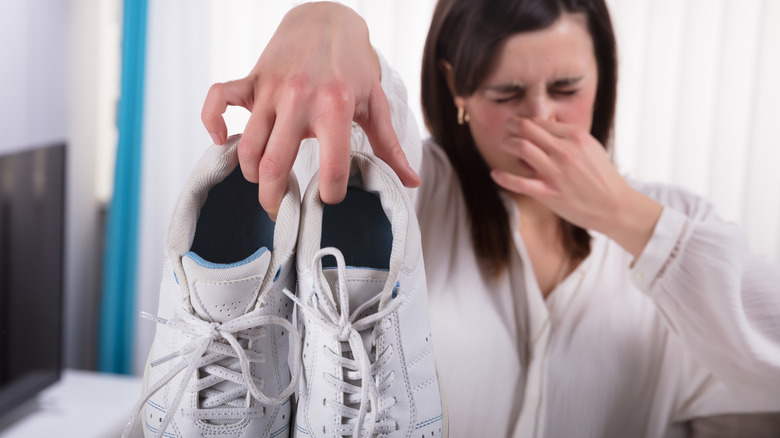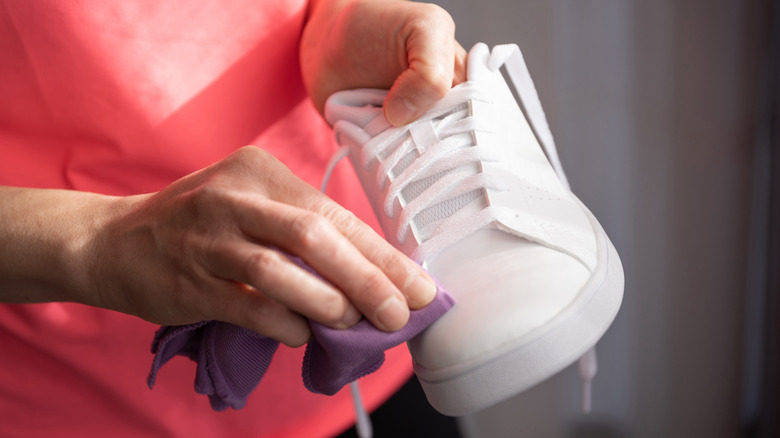Why You Should Be Sprinkling Salt Into Your Stinky Shoes
They're on your feet for hours at a time trapping in sweat, moisture, and bacteria. It's no wonder your shoes have a foul odor when you remove them at the end of a long day. Dealing with the putrid scent is embarrassing enough when sliding off kicks in your own home, but the scenario can be exponentially more humiliating when you are visiting friends who have a strict rule against wearing outside shoes in the house. Fortunately, you don't have to buy new footwear to avoid the awkward moment. Instead of digging into your wallet, simply reach into the pantry and sprinkle some salt into your sewage-scented shoes. The kitchen staple's natural absorption powers act as a deodorizer so you can feel free to kick up your bare heels regardless of whose house you are in.
Rotten eggs, skunk spray, sulfur — whatever you compare it to — the gag-inducing stench emanating from acrid footwear is not easy to hide, especially if you live in cramped quarters. Still, as ripe as the funk may be, don't let it force you into isolation. Stinky shoes are a common conundrum for many homeowners because the source of the smell comes from an everyday occurrence — sweating. Your feet are home to more sweat glands per square inch than anywhere else on your body. So even with the best foot hygiene and concerted attempts to make your house smell amazing, there's a good chance stinky shoe smell will infiltrate your living space.
How to use salt to freshen smelly shoes
Start by liberally pouring salt into stinky shoes and shaking until the insoles are sufficiently covered. If your shoes are particularly fetid, coat every inch of the interior as the bacteria causing the odor has likely soaked into the fibers. Once you have placed an even layer of salt in your shoes, allow them to sit overnight or 24 hours, depending on the severity of the smell. At the end of the time period, dump out any remaining salt, then use your vacuum's crevice tool attachment to suck up any residual grains.
If you are concerned about throwing away the salt used to deodorize your footwear, consider repurposing it to clean dirty canvas shoes. Simply dump the salt from your shoes into a bowl rather than into the trash. Next, mix 1 tablespoon of the used salt with 1 cup of warm water. Once the ingredients are thoroughly mixed, dip a clean cloth in the solution and gently wipe any interior or exterior stains. After the shoes have dried, gently brush off any residual salt.
Regular table salt will effectively eliminate odors from most types of shoes; however, if you are concerned that the tiny granules will be impossible to completely remove, consider using kosher or sea salt — which feature larger crystals — instead. Just refrain from using rock salt. Despite its larger grain size, road salt can crack and split the exterior of shoes, especially ones made of leather.
Salt is a natural shoe disinfectant
And you thought salt only made food better. Turns out the seasoning is a much more versatile household item than it's often given credit for. When it comes to alleviating footwear funk, salt acts as an organic antiseptic by combating acidic bacteria that lingers in shoes and causes them to reek like a cesspool. The key to battling stinky shoe smell is to get rid of dampness. Hot, sweaty feet bathe shoes in moisture which creates the ideal environment for bacteria to thrive. However, salt has the ability to absorb excess moisture and neutralize the sulfuric scent. Moreover, the inexpensive, non-toxic, eco-friendly mineral is able to attack the root of the rotting smell rather than mask it like spray air fresheners, oils, or candles.
Think of salt as a natural deodorant for shoes. But instead of rubbing a stick under your arm, just pour salt into smelly shoes. Doing so will allow the condiment's antimicrobial and antibacterial properties to produce conditions that are inhospitable to odor-causing bacteria. The salt technique is especially effective if your shoes are made of synthetic materials like plastic flats and pleather boots which generally retain more malodor than footwear made of natural materials such as rubber, suede, and leather. Ideally, you want a shoe that offers the best ventilation to reduce foot sweating. Naturally breathable shoes made from knit fabric, mesh, or perforated leather allow for maximum airflow.

